“Hands” — Writing as an act of Resistance

by Alun Hughes | Dialect
IT WAS A WEDNESDAY EVENING IN April and I was trying to make a rendezvous with a friend and collaborator who I am making a poetry film with. He couldn’t commit to a plan as it had got very busy in his house.
He and his family were preparing to attend a ‘Funeral for Nature’ due to be held in Bath that weekend and organised by Code Red for Nature. His wife and daughter were to be in the procession of ‘Red Rebels’ and he was busy sewing their costumes.
Yes folks, I look back at those last couple of sentences and reflect that it is only in these times we are living through I could have written that.
A tiny snapshot of a family preparing to take part in an act of protest against the troubles we’re in, a particularly theatrical and beautiful one, and one amongst thousands of acts of resistance taking place as we speak.
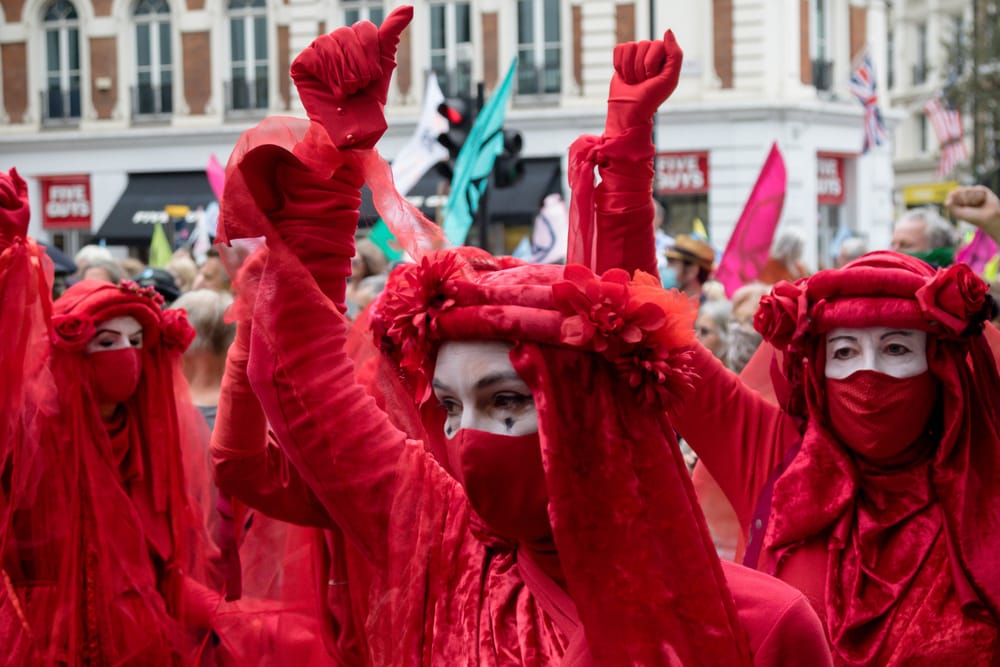
But I am going back to the spectacle of ‘The Funeral for Nature’ and footage of it encircling The Circus in Bath, one of the grand terraces built by the merchant slavers of Bristol as a playground. I can’t help admiring the way time compresses in a moment where, in this instant, resistors to the ongoing destruction of our home by the colonial, capitalist extraction do so surrounded by its earlier spoils.
As I watched film of the funeral unfold, it was a specific detail that I became focussed on.
It was the upturned hands of the Red Rebels as they made their way through the city. There were many other people, dressed in blacks and greys, some playing a single slowed beat on drums, playing the death march.
But let’s leave that scene now, with the cameras buzzing, the drums fading into the distance, with one image, one memory; the upturned, red gloved palms, the beseeching, grieving hands, held open and turned skyward. We’ll come back to our hands.
‘What am I actually resisting?’
WHEN I STARTED THINKING ABOUT making this, I had to start by asking, ‘What am I actually resisting?’
I live a relatively straight forward life, living, working, and raising children in a small town. I join with many, at the radio, listening to the terror news media overwhelm me daily, spelling out that resistance is futile, that we’re completely fucked, that it is hopeless.
Sure, I might post or share a few worthy words on my particular social media echo chamber, but I don’t make an enormous effort, beyond my thoughts and my writing, to ‘resist’ them.
I, like most of us, spend my time working (in my case, for the last decade or so, landscaping and making various garden constructions) to pay bills, keep a roof over our heads and survive.
So, I write to you now, from the elm desk, remembering Elie Wiesel, who said, “I write to understand as much as to be understood.”

Let’s begin then, by remembering those hundreds of hands, upturned, wrapped in red material and head on into the resistance.
Yes! I’m feeling it a little now, feeling resistant. I may indeed be writing this as an act of resistance and not as a title at all because, well, apart from transgressive behaviour and disobedience being attractive, if I behaved myself, knuckled down and wrote this as you might be expecting… well yes, we could enter into a familiar dance, where we stay at a comfortable distance from each other and exchange a pattern learnt in our colonial education system.
I could say all the right things in the right order that might, dear reader, reinforce your worthiness, your liberal cool and, like any other social media echo chamber, re-affirm the values that keep the complacency comfortable, the complicity tidily stashed away, but ultimately leave us both feeling pointless and empty. I definitely feel resistant to that.
Resistant Nature
RESISTANCE: A SECRET ORGANISATION THAT fights against authority in an occupied country.
Resistor: a device that resists the passage of a current.
Most of my boyhood heroes were from films on rainy Sunday afternoon TV. French resistance fighters, clad in leather coats and berets, toting Tommy guns and fighting the Nazi occupation.

Or First Nation warriors battling the Cavalry in a Western. I invariably took the same side.
I remember watching the Poll Tax Riots of 1990 with a recent exile’s glee in a house in Sydney at the beginning of the end for Maggie Thatcher.

A few years later, during my involvement with The Land is Ours campaign of trespass, I started reading about the Diggers and the Luddites.
The list of resistance goes on to the present day, where good folk all over are standing against the extractors for a vision of a more just, beautiful and equitable world.
Here then, are resistors, activating via protest, by ‘getting in the way’. I want to dwell here a little longer though and try to get a bit clearer on what, exactly, I feel resistant to.
There are, after all, folks in our community who actively (and often aggressively) resist another’s right to speak (and think) freely, pursuing them out of their careers, their ways and places of making a living.

Exacerbated, no doubt, by polarizing algorithms, simultaneously feeding outrage and belonging, the machine continues to separate and classify us in the quest for binary dominance.
Okay, now I’m feeling it. The list is as long as you care to make it. It seems that, for each flow of human current there will inevitably be its resistor, like a shadow and light making the whole picture.
So, what, I ask again, am I actually resisting? What is the flow of human current that I hope to change?
As a child in seventies London, I remember sitting with my brothers in Victoria station, waiting for a train home. We were watching a bin on the concourse, fantasising, if someone from the IRA had planted a bomb in it and it were to go off, which of us would most likely get hit by the shrapnel.
My Dad cycled past the Old Bailey just a few minutes before a car bomb exploded outside the criminal court in 1973.
Yet, maybe due to my Dad’s Welsh nationalism or, having many friends with Irish parents who, on Saturday mornings, would throw their windows open and blast out Rebel music from their stereos, we regarded the IRA as freedom fighters, pursuing their cause to free themselves from English colonial rule.
1066 and All That
I’m still at the elm desk, in a rented flat, in a small post-industrial wool town that, like many others, is surrounded by grand country estates built by robber barons, mill owners, merchant slavers, privateers and the like.
I write this in 2024, 958 years since the last colonial conquest of England. The colony here is old and deep, so much so that we can’t remember anything else or, indeed, recognise the truth of our situation.
Two years ago, I read The Book of Trespass by Nick Hayes. It is a superb examination of the ongoing exclusion of people from the land by private interests since 1066. He trespasses on these estates, including Royal ones and tells their stories, how they came to be here today.
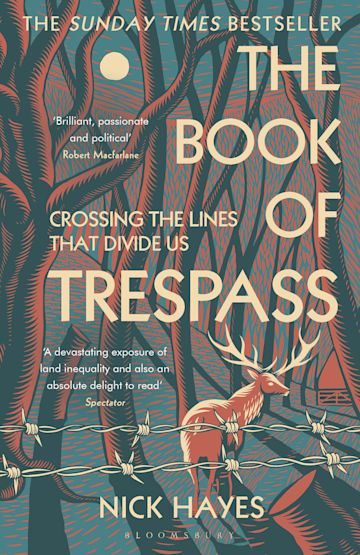
The litany of woes from the various oppressions of what he calls ‘the cult of exclusion’ is cruel, long, and bloody. From the enclosures and clearances, the transportations, imprisonments and summary executions, our establishment is forged in violence over time.
A time so long now, that the conditions we live in and under seem normal. How that has happened, the ‘normalisation’, he terms as ‘spells that bind us’.
For reasons that will arise as we go along, I’d been trying to locate ‘indigenous feeling’.
From all these years of systematic destruction of our relationships with our home (and the more you look, the more entrenched the forgetting seems) I have been drawn to the poetry and literature of the Haida people of the Vancouver coastal region through the work of the poet and cultural historian, Robert Bringhurst.
Sand Talk and Right Story, Wrong Story by the Aboriginal academic, Tyson Yunkaporta have also figured highly. Sand Talk is subtitled ‘How Indigenous Thinking Can Save the World’.
I wanted to investigate the perspectives of people for whom the colony is younger, the wounds fresher and their culture, if not completely intact was still surviving in various hybrid forms.
At this stage, I was gifted another work entitled We Are in the Middle of Forever, an anthology of ‘Indigenous Voices from Turtle Island on the Changing Earth… an indispensable aid to those looking for new and different ideas and responses to the challenges we face.’
Just one of the many voices was that of Alexii Sigona, a Mutsun man from the foothills of the Santa Cruz Mountains in California whose ceremonial grounds, at time of publication (2022), had been acquired by an investor group with aims to develop a 320-acre open pit sand and gravel mine (Cotswold Water Park).
Alexii had been asked to talk about stewardship, being what Yunkaporta terms ‘the custodian species’. He discusses differences in periods of occupation of the region — an important element being the introduction of fences (or long winding drystone walls and hedges) and a broadening and deepening of the concept of private property.
“This is not yours,” Alexii says of the core message of having a fence (or wall if you can afford it) around land.
“The privatisation of land enabled the government to kick Native people off lands where they lived and gave people the ‘right to exclude’” (Enclosure Acts).
He goes on to explain how ‘this became part of the colonialist culture… this was the worst thing that could have happened because his people could no longer live there, and once the tribe was prevented from accessing the land, they could no longer conduct their ceremonies. (the fate of witches).
Please forgive my clumsy, bracketed interjections, I’m sure I don’t need to point out the parallels to our own home spun predicament.
I am just trying to bring it out into the light a little to remember that we are in the same boat, resisting the same flow of human current, of the destruction of our planetary home by what we have become.
Also, by way of spelling out our common ground on which our communal, global feet stand and brace themselves for the struggles that lie ahead.
There May Be Trouble Ahead, but …
I started expressing my resistance in the mid-nineties at the Newbury Bypass protests.
This was the moment of my initial activation from which I went on to involvement with Critical Mass, The Land is Ours and Reclaim the Streets protests. But ‘getting in the way’ was not enough, I didn’t want to only say ‘No’. I wanted to be involved with positive solutions, so I co-founded a Community Land Trust that, through a participatory design, raised funds to secure land in perpetuity, never to be sold again and, effectively, giving it back to itself.
From there, I worked as a farm hand on an organic farm, collected kerbside recycling boxes in a Brighton workers co-op, managed woodland, made yurt frames and helped build the first Earthship in Britain.

Then, my children arrived and the real work began. I continued managing woodland, making chairs, laying hedges and teaching.
It was whilst working as a tutor at a land-based college that I was first exposed to ‘nature-based practices’, an umbrella term under which a broad and diverse palette of approaches sit and mix. Some of these are called wilderness work, nature-based rites of passage or ecotherapy.
Why am I telling you this?
THE DISCOVERY OF NATURE-BASED PRACTICES AND my repeated witnessing of the profound changes that happened to people, as well as myself, when we re-connected with our own deep human nature, in nature, was the end of a road.
I had been trying, over those years, to express my resistance, to do something that contextualised my desire to act. But, as it unfolded, I came to understand the qualitative difference between how we think and therefore act on our troubles and how we feel about our home and begin to take care.
The ecologist and writer, Gary Snyder, has accompanied my journey since my days living in California in the early nineties. It was by a stroke of luck really.
I was on my road, following literary trails of Ginsberg, Kerouac et al. and Snyder came into view via his associations with ‘The Beats’. In his book, Turtle Island, which includes his Pulitzer Prize for Poetry winner for 1975, Four Changes, he expresses hope that all the people of America, regardless of where they come from in the world, find ways of nurturing an ‘indigenous feeling’ for the land on which they find themselves.
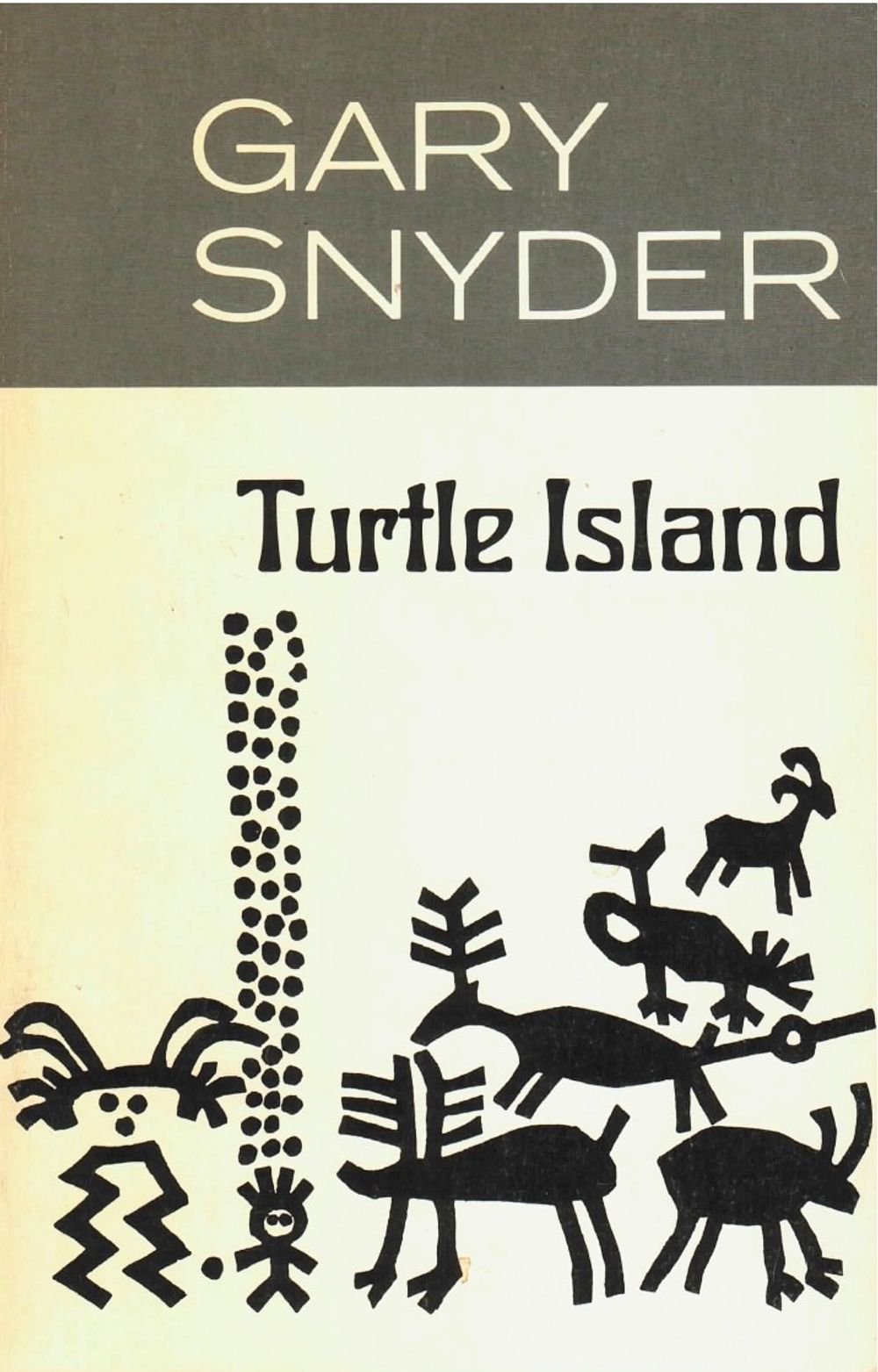
Seems like a tall order doesn’t it? But tall is the order of the day when we think of everything that is coming towards us. The poly-crises that confront us now, in the accelerating entropy of a system that no longer serves creation seem insurmountable.
This is ‘the trouble’ that Donna J. Haraway, in her excellent work, suggests we must ‘stay with’, what she terms ‘the thick present’, ‘a tentacular web of troubling relations that matter now.’ Or maybe, as Nora Bateson suggests in an interview for the Entangled World podcast, ‘we can’t de-colonise, we’re in too deep.’
We simply don’t know what this world we’re dreaming looks like.
Who will be left?
How many will survive?
After all, the colony is ultra-violent, its historical success is its superior ability to organise violence.
This is why nonviolent direct action is such a crucial approach to resistance and protest and why groups like Extinction Rebellion have been so successful in changing the public conversation regarding Climate Change.
From the Tattered Ashes, Hands
Poiesis:
“the activity in which a person brings something into being that did not exist before.” (Philosophy)
“to make” (Etymology)
Take a short cruise in the Podcast Sea and it’s not difficult to come across makers who are devoted to building the foundations of a civilisation that could, potentially, exist regeneratively with its only home.
There are makers of sense, change, policy and meaning. They think, and talk, beautifully.
Away from that sea and back on dry land, there are regenerative farmers, craftspeople, land and water repairers.
These are the hands that have trained themselves in making the materiality of the world we’re dreaming.
A civilisation in waiting and, in these transition times, when systemic entropy is self-evident, these people, with heart, head and hands, are the makers of a succession.
This is the creative act of resistance, in the nature of a resistor, to change or alter flow.
My choice to act through my writing is to continue following and clutching the threads I can see that connect to a tiny part of this great weave that is taking place to balance ourselves with our home.
For me, this is trying to listen to creation for what is required of me to contribute to my community and to our evolution.
I continue to pursue an ever deeper connection with the land by exploring feelings of indigeny which we all share, as ‘the custodian species’, and being part of a collective remembering that, to evolve from the colony and all that it has wrought, the land must be returned to itself and, who belongs to who, reversed.
To resist is to create in our times. Artists and makers can create from the unknown, draw from the mystery. Some are adept at the deep dive into the well of excruciating grief and despair (the thick present) yet, somehow return with some treasure, a gift from the unknown that the artist carries to and for their community.
Or maybe finding, making and appreciating beauty is the true act of resistance?
I was listening to a man called Four Arrows, aka Dr. Don Trent Jacobs, being interviewed on Entangled World. He told a story of women on the Trail of Tears, being force marched away from their ancestral land in horrific conditions, singing to the children of all the beauty they passed, singing love songs to the land.
Pause. Imagine.
I AM REMEMBERING NOW WHERE WE began, with the upturned hands of those ‘Red Rebels’ at their ‘Funeral for Nature’. Those red clad hands, held in a gesture of astonished supplication to the troubles we’re in.
I am remembering us, staying together, making the place we’re dreaming, now.
I am remembering that it is in our hands. That we are many. Good Luck.
Here’s Max Bygraves to play us out.
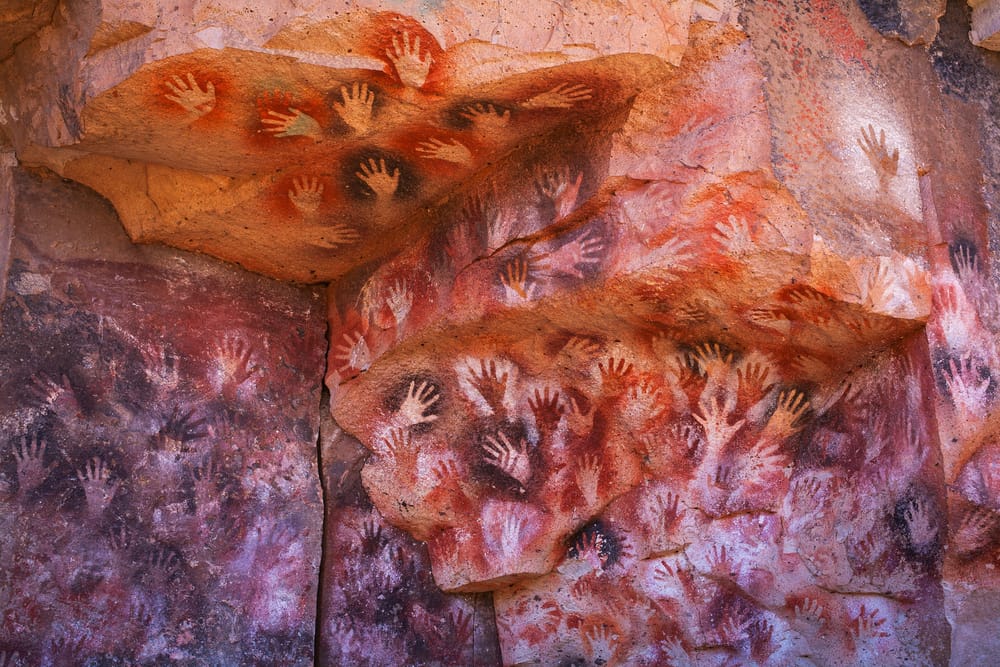
Resources & Links
Podcasts
The Entangled World
The Emerald
Books
The Book of Trespass. Nick Hayes, Bloomsbury, 2020
Green and Unpleasant Land. Corinne Fowler, Peepal Tree, 2020
Sand Talk and Right Story, Wrong Story. Tyson Yunkaporta, Text Publishing, 2019 and 2023.
We Are the Middle of Forever. Dahr Jamail and Stan Rushworth Ed., The New Press, 2022.
Staying with the Trouble. Donna J. Haraway, Duke University Press, 2016.
Turtle Island. Gary Snyder, New Directions, 1974.
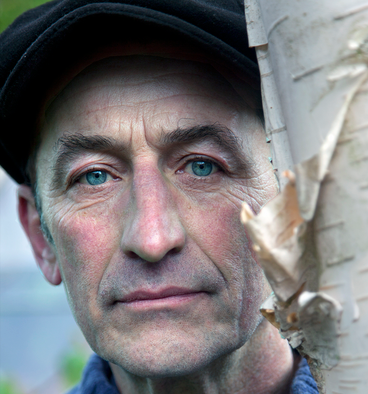
Alun Hughes is a writer and wilderness guide living in Stroud. He is a writing tutor with Dialect. Alun's poetry pamphlet Down the Heavens, is published by Yew Tree Press.
Somewhere Somewhere, an album of nine poems from the collection to original soundtracks, made with the band Lensmen, is available on Bandcamp. He is currently making a poetry film and working on his next collections.



Amplify Stroud is supported by Dialect rural writers collective. Dialect offers mentorship, encouragement and self-study courses around Rediscovering Albion and Human=Nature as well as publishing.
You can find out more at https://www.dialect.org.uk/







Member discussion